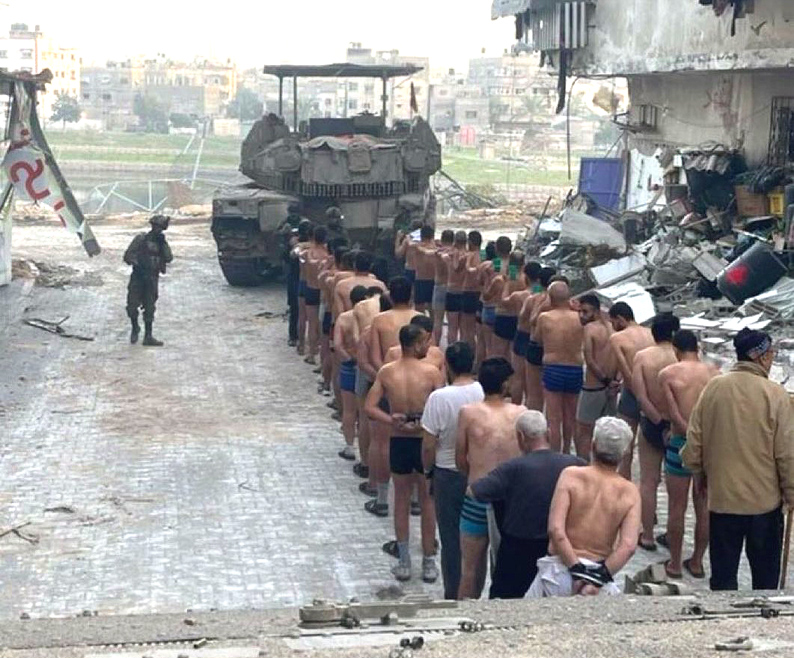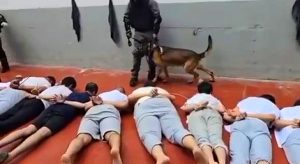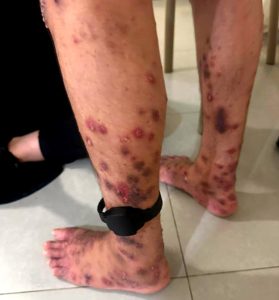
PALESTINIAN detainees released back to Gaza have told the BBC they were subjected to mistreatment and torture at the hands of Israeli military and prison staff, adding to reports of misconduct within Israel’s barracks and jails.
The BBC conducted in-depth interviews with five released detainees, all of whom had been arrested in Gaza after October 2023.
The BBC stated: ‘The men were held under Israel’s Unlawful Combatants Law, a measure by which people suspected of posing a security risk can be detained for an unspecified period without charge, as Israel set out to recover the hostages and dismantle the proscribed terror group.
‘The men say they were accused of having links with Hamas and questioned over the location of hostages and tunnels, but were not found to be involved in the 7 October 2023 attacks – a condition Israel had set for anyone released under the recent ceasefire deal.
‘Some of those freed under the deal were serving sentences for other serious crimes, including the killing of Israelis, but that was not the case for our interviewees.
‘We also asked the Israel Defence Forces (IDF) and the Israel Prison Service (IPS) if there were any convictions or accusations against the men, but they did not respond to that question.

‘In the men’s testimony: They each describe being stripped, blindfolded, cuffed and beaten. Some also say they were given electric shocks, menaced by dogs, and denied access to medical care. Some say they witnessed the deaths of other detainees. One says he witnessed sexual abuse. Another says he had his head dunked in chemicals and his back set on fire.
‘We have seen reports by a lawyer who visited two of the men in prison, and have spoken to medical staff who treated some of them on their return.
‘The BBC sent a lengthy right of reply letter to the IDF which laid out in detail the men’s allegations and their identities.
‘In its statement, the IDF did not respond to any of the specific allegations, but said it “completely rejects accusations of systematic abuse of detainees”.
‘It said some of the cases raised by the BBC would be “examined by the relevant authorities”. It added that others “were brought without sufficient detail, without any detail regarding the identity of the detainees, making them impossible to examine”.
‘It continued: “The IDF takes any … actions which contradict its values very seriously … Specific complaints about inappropriate behaviour by detention facility staff or insufficient conditions are forwarded for examination by the relevant authorities and are dealt with accordingly. In appropriate cases, disciplinary actions are taken against the staff members of the facility, and criminal investigations are opened.”
‘The IPS said it was not aware of any of the claims of abuse described in our investigation, in its prisons. “As far as we know, no such events have occurred under IPS responsibility,” it added.’
Dr Lawrence Hill-Cawthorne, co-director of the Centre for International Law at the University of Bristol, said the treatment the men described was ‘entirely inconsistent with both international law and Israeli law’, and in some cases would ‘meet the threshold of torture’.
‘Under international law, the law of armed conflict requires you to treat all detainees humanely,’ he said. ‘The obligations relating to the basic needs of detainees are unaffected by any alleged wrongdoing.’

The BBC continued: ‘The five Palestinians interviewed in depth were returned earlier this year under the ceasefire deal with Hamas – the group that led the 7 October 2023 attacks on Israel.
‘They were among about 1,900 Palestinian prisoners and detainees exchanged for 33 Israeli hostages, eight dead and 25 living, some of whom have described being abused, starved and threatened by their Hamas captors.
‘Female hostages previously released have detailed physical and sexual assaults in captivity.
‘Israel says forensic tests show some of the dead hostages returned in the ceasefire, including children, were killed by Hamas, though the group denies this.
‘The five released Palestinian detainees all described the same pattern – being arrested in Gaza, taken into Israel to be detained first in military barracks before being moved on to prison, and finally released back to Gaza months later.
‘They said they had been abused at every stage of the process.
‘More than a dozen other released detainees, whom the BBC spoke to more briefly as they arrived home in Gaza, also gave accounts of beatings, hunger and disease.
‘These, in turn, align with testimony given by others to Israeli human rights group B’Tselem and the United Nations, which in July detailed reports from returning detainees that they had been stripped naked, deprived of food, sleep and water, subjected to electric shocks and burned with cigarettes, and had dogs set on them.
‘A further report by UN experts last month, documented cases of rape and sexual assault, and said using this as a threat was “standard operating procedure” for the IDF. Israel responded to say it “categorically rejects the unfounded allegations”.
‘As Israel does not currently allow international journalists free access to Gaza, our interviews were conducted by phone call and text message, and also in person by our contracted freelancers in the territory.
‘All five men told us their abuse had begun at the moment of their arrest – when they said they had been stripped, blindfolded and beaten.
‘Mechanic Mohammad Abu Tawileh told us he had been tortured for days.
‘He was taken by soldiers to a building not far from the location of his arrest in March 2024, he said, and held in a room – the sole detainee there – for three days of interrogation by troops.
‘Soldiers mixed chemicals used for cleaning into a pot, he told us, and dunked his head in them.

‘The interrogators then punched him, he said, and he fell to the rubble-strewn floor, injuring his eye. He said they then covered his eye with a cloth, which he said “worsened his injury”.
‘They also set him alight, he told us. “They used an air freshener with a lighter to set my back on fire. I thrashed around like an animal in an attempt to put the fire out.
“It spread from my neck down to my legs. Then, they repeatedly hit me with the bottoms of their rifles, and had sticks with them, which they used to hit and poke me on my sides,” he said.
‘They then “continued pouring acid on me. I spent around a day and a half being washed with (it),” he told us. “They poured it on my head, and it dripped down my body while I was sitting on the chair.”
‘Eventually, he said, soldiers poured water on his body, and drove him into Israel where he received medical treatment in hospital, including skin grafts.
‘Mohammad Abu Tawileh’s back shows it is covered in raised red welts.
‘Most of his treatment, he said, took place at a field hospital at Sde Teiman barracks, an IDF base near Beersheba in southern Israel.
‘He said he was cuffed naked to a bed and given a nappy instead of access to a toilet.
‘Israeli doctors at this hospital have previously told the BBC shackling patients and forcing them to wear nappies is routine.
‘When the BBC interviewed Mr Abu Tawileh shortly after his release, his back was covered in red welts. The residual pain from his burns still woke him up, he said, and his vision had been affected.
‘The BBC was not able to speak to anyone who witnessed an attack on Mr Abu Tawileh, but a specialist eye doctor who treated him on his return to Gaza confirmed that he had suffered a chemical burn to the eye, damaging the skin around it. He also said Mr Abu Tawileh’s vision was weakening, due to either the chemicals or other trauma.
‘We showed images of his injuries and gave details of his testimony to several UK doctors, who said they appeared consistent with his account, though they noted there were limitations to what they could assess by looking at photos.
‘The BBC gave extensive details of this account to the IDF, giving it five days to investigate. It did not respond directly to Mr Abu Tawileh’s allegations but said it took any actions “which contradict its values very seriously”.
‘It said it would “examine” some of the cases, but did not respond to follow-up questions about whether this included Mr Abu Tawileh.
‘A specialist eye doctor in Gaza confirmed Mr Abu Tawileh had suffered a chemical burn to the eye, damaging the skin around it.’